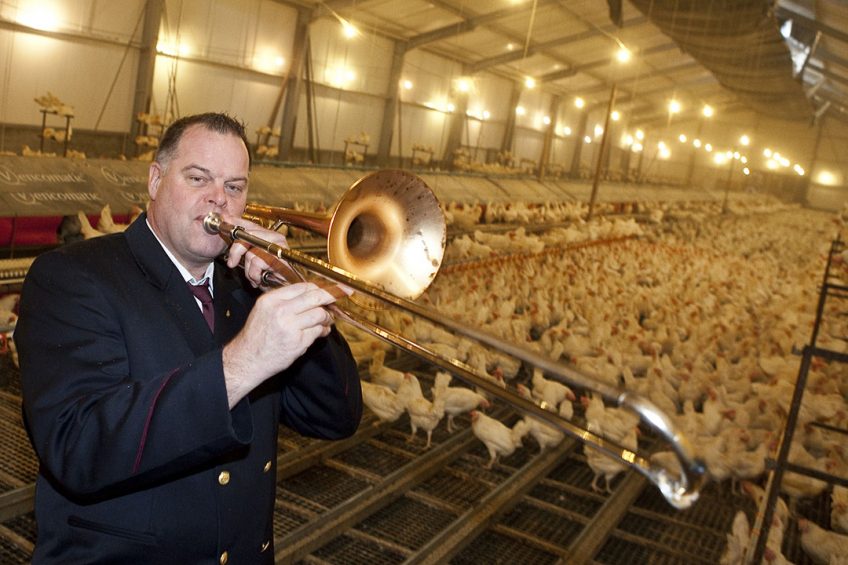UK egg farmer plays music to his hens

Egg producer Glenn Haggart has for the past 4 years been trialling sounds and music in hen sheds to his 64,000 birds. And he believes so strongly that music is making a difference to his hens that he will trial out his finding on a new flock of Dekalb Whites.
Glenn, who produces eggs for Stonegate from his Addington Farm in Lancashire, wanted to enhance bird welfare and after seeing a farmer on television preparing his turkeys for bonfire night by slowly adding sounds to the routine, decided that music could keep anxiety and stress down as well as creating a safe environment for the birds.
How it works
Working with Innovative Farmers, 2 sheds are set up with sound insulation and 2 without, as a control. The birds enter at 16 weeks and are slowly introduced to the music, which is played at different points of the day to help control their routines of feeding and sleeping. So, they have 25 minutes of music to help them wake up and 40 minutes in the evening to help them as they manoeuvre on to their perches to sleep. Then serene, dolphin music is played while they sleep.
Music and sound can also distract the girls [hens] if they begin fighting…”
Glenn says the birds are much calmer: “A few years ago, when vets or others visited, the bird weren’t sure of who these strange sounds were coming from, and they’d start cooing from fear. Nowadays, anyone can walk around the shed and the girls don’t mind it at all; they’re not even bothered by drilling, because it helps them get use to a range of noises and partially disguises them. Music and sound can also distract the girls if they begin fighting – they quickly forget what they are doing.” Glenn, who is a former Farmers Weekly poultry farmer of the year finalist, added: “I haven’t found that music has directly resulted in more eggs, but if you are getting the essentials right – feed, water, litter, ventilation and red mite control, and so on, it should contribute to higher egg production.”
 Webinar: Sustainability and Welfare
Webinar: Sustainability and Welfare
If you missed this webinar you can now view it on demand
Research on what music is best for the hens
A lot of research has focused on different styles of music but Glenn feels variation is best. Radio works well because it has different types of music, voice and sound effects, whereas if you just use a set playlist the birds will only get used to those sounds. “We have a playlist overlaid with the sounds of people talking, farmyard noises like tractors, sheep, alpacas, birds and rain sounds noises that the birds hear day to day.”
New flock challenge – take them to 100 weeks
The goal with the Dekalb Whites is to take them to 100 weeks, non-beak trimmed and with full feather coverage. Taking them to 100 weeks is a challenge, he recognises, but as they get older and immunity starts to wear off, being able to instantly relax the birds could enhance and extend their lives. “It took a while for us to get the sound coverage spread across the sheds and working with Innovative Farmers enabled us to equip the sheds with surround sound to do that. Hens in both the control shed (ie no sound) and the shed with sound, will be fed on the same feed package this time, so that is removing one of the variables from the equation.”
 Research looks at ‘forest chicken’ for animal welfare
Research looks at ‘forest chicken’ for animal welfare
The University of São Paulo (USP) has done research into the viability of a so called agroforestry system. The goal is to produce chickens inside a “forest” in order to increase the welfare level and to reintroduce the bird to its ‘natural environment’.
Next steps
Glenn says farmers are concerned about the stressed caused by transitioning from rearing to lay. Working with our rearers to introduce quiet sounds into nesting boxes could give young birds something familiar to identify with in the new world they’re in. Research also shows that the number of floor eggs reduces when music is played in nest boxes because sound attracts them there. That means the workers don’t need to spend time picking up floor eggs and can focus on farm husbandry.
Join 31,000+ subscribers
Subscribe to our newsletter to stay updated about all the need-to-know content in the poultry sector, three times a week. Beheer
Beheer











 WP Admin
WP Admin  Bewerk bericht
Bewerk bericht